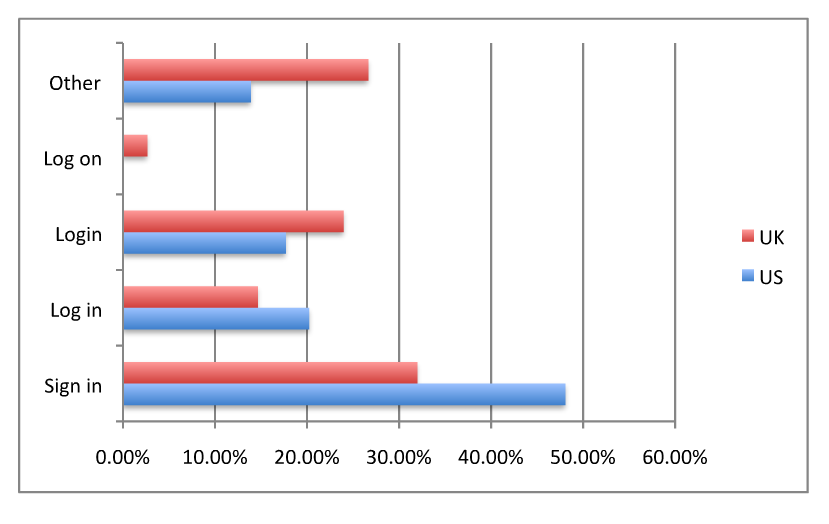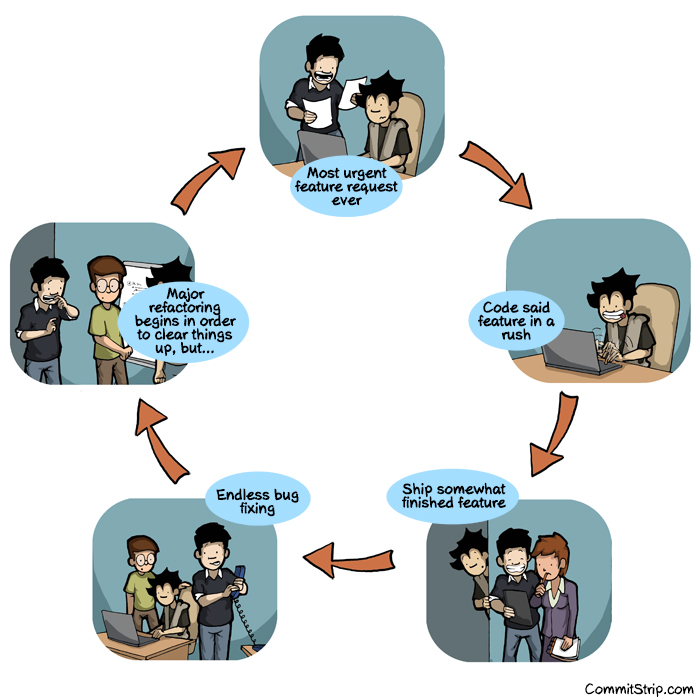I graduated with a Computer Science minor from the University of Virginia in 1992. The reason it's a minor and not a major is because to major in CS at UVa you had to go through the Engineering School, and I was absolutely not cut out for that kind of hardcore math and physics, to put it mildly. The beauty of a minor was that I could cherry pick all the cool CS classes and skip everything else.
One of my favorite classes, the one I remember the most, was Algorithms. I always told people my Algorithms class was the one part of my college education that influenced me most as a programmer. I wasn't sure exactly why, but a few years ago I had a hunch so I looked up a certain CV and realized that Randy Pausch – yes, the Last Lecture Randy Pausch – taught that class. The timing is perfect: University of Virginia, Fall 1991, CS461 Analysis of Algorithms, 50 students.
I was one of them.
No wonder I was so impressed. Pausch was an incredible, charismatic teacher, a testament to the old adage that your should choose your teacher first and the class material second, if you bother to at all. It's so true.
In this case, the combination of great teacher and great topic was extra potent, as algorithms are central to what programmers do. Not that we invent new algorithms, but we need to understand the code that's out there, grok why it tends to be fast or slow due to the tradeoffs chosen, and choose the correct algorithms for what we're doing. That's essential.
And one of the coolest things Mr. Pausch ever taught me was to ask this question:
What's the God algorithm for this?
Well, when sorting a list, obviously God wouldn't bother with a stupid Bubble Sort or Quick Sort or Shell Sort like us mere mortals, God would just immediately place the items in the correct order. Bam. One step. The ultimate lower bound on computation, O(1). Not just fixed time, either, but literally one instantaneous step, because you're freakin' God.

This kind of blew my mind at the time.
I always suspected that programmers became programmers because they got to play God with the little universe boxes on their desks. Randy Pausch took that conceit and turned it into a really useful way of setting boundaries and asking yourself hard questions about what you're doing and why.
So when we set out to build a login dialog for Discourse, I went back to what I learned in my Algorithms class and asked myself:
How would God build this login dialog?
And the answer is, of course, God wouldn't bother to build a login dialog at all. Every user would already be logged into GodApp the second they loaded the page because God knows who they are. Authoritatively, even.
This is obviously impossible for us, because God isn't one of our investors.
But.. how close can we get to the perfect godlike login experience in Discourse? That's a noble and worthy goal.
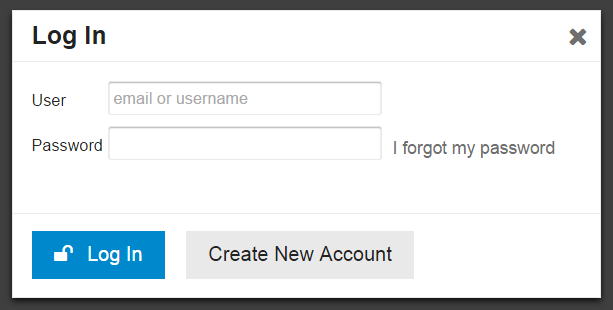
Wasn't it Bill Gates who once asked why the hell every programmer was writing the same File Open dialogs over and over? It sure feels that way for login dialogs. I've been saying for a long time that the best login is no login at all and I'm a staunch supporter of logging in with your Internet Driver's license whenever possible. So we absolutely support that, if you've configured it.

But today I want to focus on the core, basic login experience: user and password. That's the default until you configure up the other methods of login.
A login form with two fields, two buttons, and a link on it seems simple, right? Bog standard. It is, until you consider all the ways the simple act of logging in with those two fields can go wrong for the user. Let's think.
Let the user enter an email to log in
The critical fault of OpenID, as much as I liked it as an early login solution, was its assumption that users could accept an URL as their "identity". This is flat out crazy, and in the long run this central flawed assumption in OpenID broke it as a future standard.
User identity is always email, plain and simple. What happens when you forget your password? You get an email, right? Thus, email is your identity. Some people even propose using email as the only login method.

It's fine to have a username, of course, but always let users log in with either their username or their email address. Because I can tell you with 100% certainty that when those users forget their password, and they will, all the time, they'll need that email anyway to get a password reset. Email and password are strongly related concepts and they belong together. Always!
(And a fie upon services that don't allow me to use my email as a username or login. I'm looking at you, Comixology.)
Tell the user when their email doesn't exist
OK, so we know that email is de-facto identity for most people, and this is a logical and necessary state of affairs. But which of my 10 email addresses did I use to log into your site?
This was the source of a long discussion at Discourse about whether it made sense to reveal to the user, when they enter an email address in the "forgot password" form, whether we have that email address on file. On many websites, here's the sort of message you'll see after entering an email address in the forgot password form:
If an account matches name@example.com, you should receive an email with instructions on how to reset your password shortly.
Note the coy "if" there, which is a hedge against all the security implications of revealing whether a given email address exists on the site just by typing it into the forgot password form.
We're deadly serious about picking safe defaults for Discourse, so out of the box you won't get exploited or abused or overrun with spammers. But after experiencing the real world "which email did we use here again?" login state on dozens of Discourse instances ourselves, we realized that, in this specific case, being user friendly is way more important than being secure.
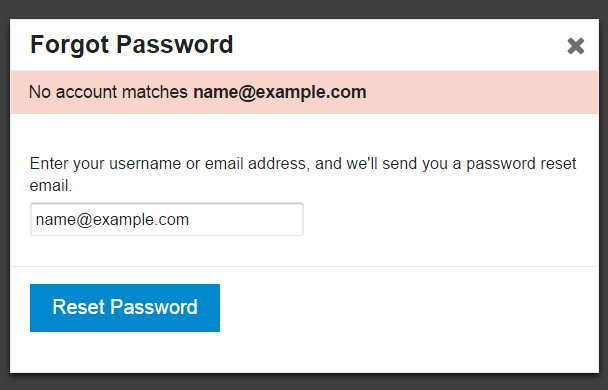
The new default is to let people know when they've entered an email we don't recognize in the forgot password form. This will save their sanity, and yours. You can turn on the extra security of being coy about this, if you need it, via a site setting.
Let the user switch between Log In and Sign Up any time
Many websites have started to show login and signup buttons side by side. This perplexed me; aren't the acts of logging in and signing up very different things?
Well, from the user's perspective, they don't appear to be. This Verge login dialog illustrates just how close the sign up and log in forms really are. Check out this animated GIF of it in action.
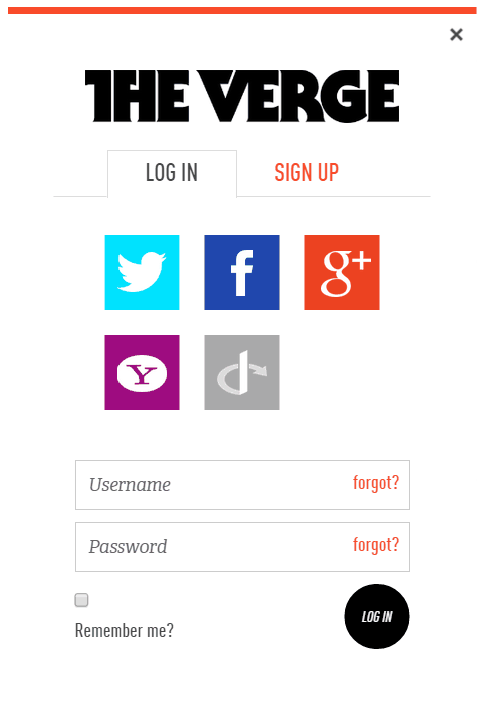
We've acknowledged that similarity by having either form accessible at any time from the two buttons at the bottom of the form, as a toggle:

And both can be kicked off directly from any page via the Sign Up and Log In buttons at the top right:

Pick common words
That's the problem with language, we have so many words for these concepts:
- Sign In
- Log In
- Sign Up
- Register
- Join <site>
- Create Account
- Get Started
- Subscribe
Which are the "right" ones? User research data isn't conclusive.
I tend to favor the shorter versions when possible, mostly because I'm a fan of the whole brevity thing, but there are valid cases to be made for each depending on the circumstances and user preferences.
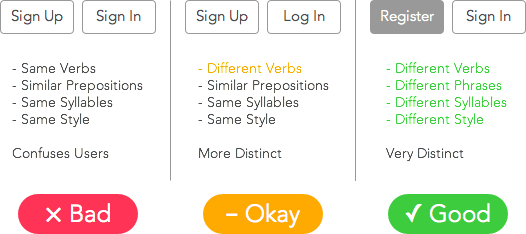
Sign In may be slightly more common, though Log In has some nautical and historical computing basis that makes it worthy:
A couple of years ago I did a survey of top websites in the US and UK and whether they used “sign in”, “log in”, “login”, “log on”, or some other variant. The answer at the time seemed to be that if you combined “log in” and “login”, it exceeded “sign in”, but not by much. I’ve also noticed that the trend toward “sign in” is increasing, especially with the most popular services. Facebook seems to be a “log in” hold-out.
Work with browser password managers
Every login dialog you create should be tested to work with the default password managers in …
At an absolute minimum. Upon subsequent logins in that browser, you should see the username and password automatically autofilled.
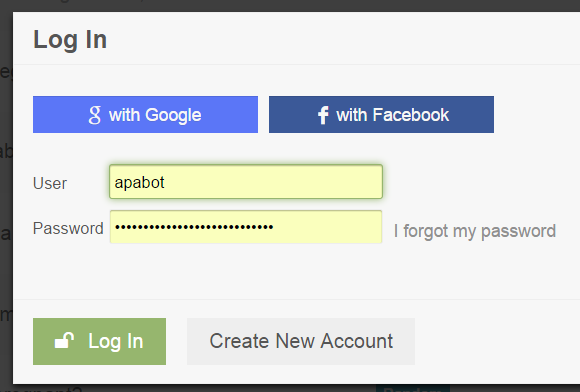
Users rely on these default password managers built into the browsers they use, and any proper modern login form should respect that, and be designed sensibly, e.g. the password field should have type="password" in the HTML and a name that's readily identifable as a password entry field.
There's also LastPass and so forth, but I generally assume if the login dialog works with the built in browser password managers, it will work with third party utilities, too.
Handle common user mistakes
Oops, the user is typing their password with caps lock on? You should let them know about that.

Oops, the user entered their email as name@gmal.com instead of name@gmail.com? Or name@hotmail.cm instead of name@hotmail.com? You should either fix typos in common email domains for them, or let them know about that.
(I'm also a big fan of native browser "reveal password" support for the password field, so the user can verify that she typed in or autofilled the password she expects. Only Internet Explorer and I think Safari offer this, but all browsers should.)
Help users choose better passwords
There are many schools of thought on forcing helping users choose passwords that aren't unspeakably awful, e.g. password123 and iloveyou and so on.
There's the common password strength meter, which updates in real time as you type in the password field.
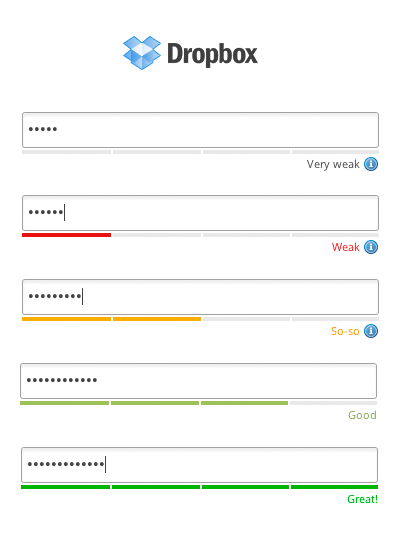
It's clever idea, but it gets awful preachy for my tastes on some sites. The implementation also leaves a lot to be desired, as it's left up to the whims of the site owner to decide what password strength means. One site's "good" is another site's "get outta here with that Fisher-Price toy password". It's frustrating.
So, with Discourse, rather than all that, I decided we'd default on a solid absolute minimum password length of 8 characters, and then verify the password to make sure it is not one of the 10,000 most common known passwords by checking its hash.
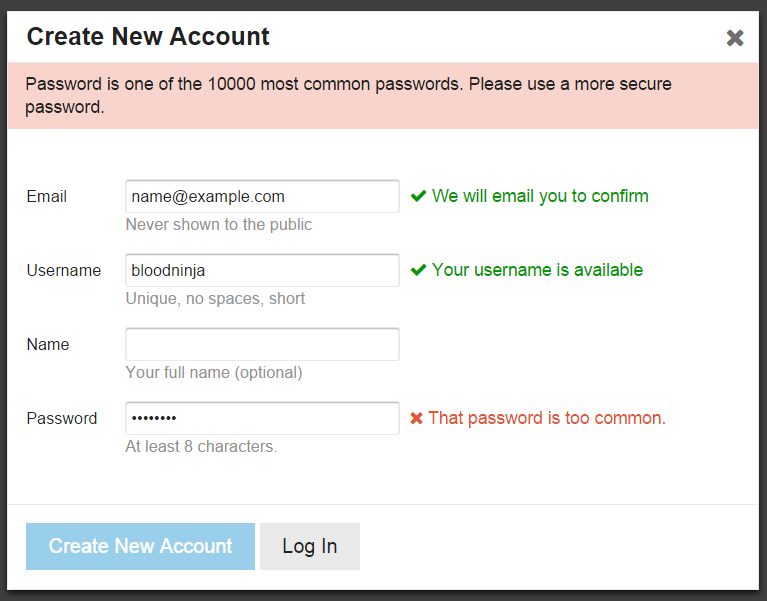
Don't forget the keyboard
I feel like keyboard users are a dying breed at this point, but for those of us that, when presented with a login dialog, like to rapidly type
name@example.com, tab, p4$$w0rd, enter
… please verify that this works as it should. Tab order, enter to submit, etcetera.
Rate limit all the things
You should be rate limiting everything users can do, everywhere, and that's especially true of the login dialog.
If someone forgets their password and makes 3 attempts to log in, or issues 3 forgot password requests, that's probably OK. But if someone makes a thousand attempts to log in, or issues a thousand forgot password requests, that's a little weird. Why, I might even venture to guess they're possibly … not human.

You can do fancy stuff like temporarily disable accounts or start showing a CAPTCHA if there are too many failed login attempts, but this can easily become a griefing vector, so be careful.
I think a nice middle ground is to insert standard pauses of moderately increasing size after repeated sequential failures or repeated sequential forgot password requests from the same IP address. So that's what we do.
Stuff I forgot
I tried to remember everything we went through when we were building our ideal login dialog for Discourse, but I'm sure I forgot something, or could have been more thorough. Remember, Discourse is 100% open source and by definition a work in progress – so as my friend Miguel de Icaza likes to say, when it breaks, you get to keep both halves. Feel free to test out our implementation and give us your feedback in the comments, or point to other examples of great login experiences, or cite other helpful advice.
Logging in involves a simple form with two fields, a link, and two buttons. And yet, after reading all this, I'm sure you'll agree that it's deceptively complex. Your best course of action is not to build a login dialog at all, but instead rely on authentication from an outside source whenever you can.
Like, say, God.
| [advertisement] How are you showing off your awesome? Create a Stack Overflow Careers profile and show off all of your hard work from Stack Overflow, Github, and virtually every other coding site. Who knows, you might even get recruited for a great new position! |

Achtung: Hier folgen teilweise antisemitische Inhalte, die ich eingebunden habe, um ihren Antisemitismus zu zeigen. Bitte nicht weiterlesen/-sehen, wenn dieses nicht erträglich ist. Keiner der Inhalte bleibt unkommentiert und ohne Einordnung und Kritik.In den letzten Wochen war ich teilweise sehr überrascht, wie viele Dinge mit offensichtlichem und - vor allem - weniger offensichtlichem Antisemitismus mir in meine Nachrichtenströme auf Twitter und Facebook gespült wurde. Vor allem von Menschen, bei denen ich mir sicher bin, dass sie erschrecken, wenn sie realisieren, welchen Kontext Dinge haben, die sie teilten.
Darum vorher ein bisschen Kontext für die Dinge, die ich hier zusammentrage:
- Ich werfe niemandem Antisemitismus vor. Mir geht es darum, den tief liegenden, auch kulturell sehr tief verwurzelten Antisemitismus sichtbar zu machen, der hinter und unter bestimmten Erzählungen und Darstellungen liegt.
- Es wäre naiv, anzunehmen, dass rund 2000 Jahre stabiler und wirkmächtiger Antisemitismus keine Spuren hinterlassen hätten. Sehr viel Literatur und sehr viel Denken bis zur Mitte des 20. Jahrhunderts ist von Antisemitismus und Judenhass durchzogen. Der Versuch der endgültigen Vernichtung sowohl der jüdischen Religion als auch des jüdischen Volkes hat das auf die Spitze getrieben. Damit ist in Europa eine neue Situation entstanden, die viele Menschen sensibel gemacht hat für die jahrhundertealte Tradition. Anderswo gab es diesen Bruch nicht.
- So wie überall gibt es auch das Phänomen des Selbsthasses. Bei den Antideutschen, traditionell bei vielen russischen Intellektuellen, unter Jüdinnen. So wenig wie eine Antideutsche als Kronzeugin herhalten kann, dass alle Deutschen scheiße seien, so wenig kann jüdischer Antisemitismus helfen, zu begründen, warum etwas nicht antisemitisch sei.
- Antisemitismus ist eigentlich das falsche Wort. Ja, das weiß ich, ich bin Theologe, remember. Korrekt müsste ich von Antijudaismus sprechen, denn Semiten sind alle semitischen Völker, darunter viele, in denen heute ein sehr großer Teil der Bevölkerung Israel vernichten will und Jüdinnen und Juden hasst. Aber politisch hat sich der Begriff Antisemitismus eingebürgert. Darum bleibe ich hier dabei. Vor allem aus Gründen der Verständlichkeit. Und weil in Europa Judenhass, seitdem er kritisiert wird, als Antisemitismus bezeichnet wird.
1. Die brutale Rachereligion
Dieses Video ist auf so vielen Ebenen unerträglich, dass es fast schwer ist, irgendwo anzufangen. Mein Pastor Peter Fahr hat es - pikanterweise als Reaktion auf die Veröffentlichung des Videos auf der Facebookseite unserer Kirchenzeitung - aber sehr gut zusammen gefasst. Denn das Video ist sowohl historisch als auch theologisch und politisch einfach nur falsch.
Was macht es antisemitisch? Vor allem zwei Aspekte, die sofort ins Auge springen: Zum einen, dass nur (und wirklich nur) die Juden im Video das Symbol ihrer Religion als Waffe benutzen. Niemand anders tut das. Die Muslime nicht mit dem Halbmond, die Ägypter nicht mit dem Skarabäus, die Assyrer nicht mit ihren Symbolen und so fort. Allein die jüdische Religion ist gewalttätig, in allen anderen Fällen ist es die weltliche Macht. Und zum anderen diffamiert bereits der Titel des Films in Buchstaben, die an das hebräische Alphabet erinnern sollen (und die ikonografisch exakt den Titel des wirkmächtigsten Nazifilms "Der ewige Jude" nachbilden), die jüdische Religion - wenn nur gezeigt wird, dass diesem Satz Gottes diese entsetzliche Gewalt folgt. Und die anderen Herrscher - Assyrer, Ägypter, Hethiter, Sumerer, Griechen, Römer, Araber, Kreuzfahrer, Engländer etc. - singen dieses Lied fröhlich weiter, als ob der jüdische Anspruch nur einer unter vielen wäre. Der Satz ist aber ein Satz Gottes. Und es wird in der Bibel immer wieder betont: Das Land gehört Gott und ist den Juden nur geliehen. Die historisch unwahre Gleichsetzung von Judas Makkabäus mit den Eroberern des Landes fällt da im Verhältnis kaum noch ins Gewicht und ist vielleicht nur für Thoeloginnen erkennbar.
Wenn jemand vorsichtig anmerkte, wie schlimm das Video sei, wurde oft geantwortet, dass doch aber Frau Paley eine anerkannte Künstlerin und außerdem Jüdin sei. Auch das ist aber ein unhistorisches Argument, das keines ist. Im 19. Jahrhundert waren unter den härtesten Antisemiten etliche Juden. Das ist - siehe oben der Vergleich mit den Antideutschen - sozusagen Normalität. Zumal ihre Website zeigt, dass sie selbst offenbar vom Hass auf ihre Religion und auf die Thora zerfressen ist.
Der antisemitische Kontext ist dabei vor allem das Narrativ vom raffgierigen Juden, der sich Land unter den Nagel reißt, das ihm nicht gehört. Verbunden mit der antisemitischen Erzählung, dass die Juden nun mal selbst schuld seien an ihrer Verfolgung und daran, dass alle andere sie hassen würden.
Das sind sozusagen die hinter diesem Bild liegenden Motive, die es sofort einleuchten lassen, dass im aktuellen Krieg gegen Israel eigentlich Israel und die Juden schuld sind. "Und die Juden" ist in diesem Fall notwendig, weil die Karten ja auch bewusst jüdische Siedlung vor der Staatsgründung mit einbeziehen. Das eigentlich perfide an dem Bild ist aber, dass es bei gleicher Färbung und teilweise gleiche Beschriftung komplett unterschiedliche Dinge abbildet. Bei Bernd ist es ausführlich dargestellt - aber zusätzlich werden auch, je nachdem, was opportun ist, um die Botschaft vom jüdischen Landraub zu untermauern, entweder jüdische oder palästinensische Siedlungsgebiete und Landbesitz einfach ausgeblendet. Mal so, mal so.
Es entsteht ein konsistentes Bild der systematischen Vertreibung der eingesessenen Bevölkerung durch die raffgierigen Juden, die darum nun mal damit leben müssen, dass sie wieder ins Meer geworfen werden sollen. Dass das weder mit diesen Karten tatsächlich gezeigt wird noch in dieser Form wahr ist, spielt dann kaum noch eine Rolle. (Bei allen Fehlern, die die Besatzungsmacht England, die die UNO, die auch vorher schon die zionistischen Siedlerinnen und Siedler gemacht haben, die unbestritten sind.)
3. Der ewige Jude
 In der aktuellen Eskalation auf Demonstrationen zur Solidarität mit der Hamas und den Palästinenserinnen
In der aktuellen Eskalation auf Demonstrationen zur Solidarität mit der Hamas und den Palästinenserinnen Ich werfe niemandem vor, dass sie in der Bewertung der Schuld am aktuellen Krieg gegen Israel die gleiche Position vertritt wie offen antisemitisch agierende Menschen, ich möchte ja auch nicht, dass ihr mir vorwerft, dass ich in dieser Frage mit unappetitlichen Rechtspopulistinnen einer Meinung bin. Nur bitte ich darum, einmal zu gucken, inwieweit das antisemitische Motiv des "ewigen Juden" im Hintergrund schwelt.
An zwei Stellen wird das für mich deutlich. Zum einen tatsächlich an der Fixierung auf den Israel-Krieg. Erst der Krieg um Israel mobilisiert viele Menschen, emotionalisiert sie. Der Krieg um Syrien oder die Ukraine nicht. Das ist nicht an sich schlimm, offenbart aber eine Fixierung, die ohne einen Hinweis darauf, dass Israel ein jüdischer Staat ist, kaum erklärbar wäre. Auch der ewige Verweis auf Konzentrationslager und Nazis gehört in den Kontext. Die Vorstellung, das Volk, das knapp der vollständigen Vernichtung entkommen ist, habe sich moralisch und ethisch anders zu verhalten, ist zutiefst antisemitisch in seiner Fixierung auf den ewigen Juden.
Zum anderen hat mich wirklich bestürzt, was eine Freundin mir letzte Woche erzählte. Dass sie Jüdin ist, wusste ich nicht, sie erwähnte es nebenbei, als wir über antisemitische linke Kommentare sprachen, die einige auf meiner Facebook-Seite hinterließen, bevor ich sie blockte. Und sagte, dass sie in ihrem Studium und in ihren Jobs (vollkommen akademisches Mittelschichtumfeld ohne muslimische Einwanderer) oft die Antwort bekam, sie sähe gar nicht aus wie eine Jüdin, wenn beiläufig bekannt wurde, dass sie eine ist.
Das "meint niemand böse" und wahrscheinlich ist sich auch kaum eine bewusst, dass es nicht mehr nur verdeckt sondern offen antisemitisch ist - aber das erschreckt mich doch. Es ist erklärbar, Jahrhunderte Erzählung vom "ewigen Juden", eine systematische Vermessung von Nasen etc. müssen ja nachwirken. Aber es ist weder eine Kleinigkeit noch witzig.
4. Die Kinderschänder
Ob Brunnen vergiften oder Kinder schänden - "die Juden" sind immer an allem Schuld gewesen. Ich nehme an, dass Jürgen Todenhöfer, der wieder einmal im TV seine kruden Thesen ausbreiten darf, jede
Wie mit dem leuchtend staubfreien Kinderspielzeug in zerstörten Häusern. Ohne auch nur ein offen antisemitisches Wort sagen zu müssen, schreit dieses Bild: Seht her, diese Juden schänden die Kinder. Vergiften die Brunnen. Während die armen Opfer, wenn sie sich wehren, lediglich eine Sauna zerstören. Was ein weiteres Motiv bedient - denn was drückt den absurden Reichtum "der Juden" besser aus als eine Sauna (!) in einem der heißesten Flecken rund ums Mittelmeer. Der jüdische Wucherer lässt grüßen.
Dass Todenhöfers Bilder und Geschichten so einen Widerhall finden, hängt auch (nicht nur, klar) mit den tiefen, über Jahrhunderte gewachsenen Ressentiments
5. Auge um Auge
Der historische zivilisatorische Fortschritt, aus Rache keine Eskalation zu suchen sondern nur eine Kompensation, wurde in der europäischen Geschichte des Antisemitismus immer wieder gegen die jüdische Religion gewandt. Hier die Rachereligion (siehe oben), da die andere Wange, die hingehalten wird.
Dass die Autoritäten der Palästinenserinnen statt Bunkern und Schutzzäunen und einer Raketenabwehr lieber Abschussrampen und Tunnel für den Waffenschmuggel bauen, ist fast egal, wenn das Ungleichgewicht der Kinder, die in diesem Krieg sterben, so krass ist.
Wenn radikalisierte Menschen sich als Schutzschild auf Waffenlager stellen, kann man sie dann wirklich Zivilistinnen nennen? Und dass Israel seine Bevölkerung schützt, Bunker baut, Warnungen rausgibt, einen Zaun und eine Raketenabwehr installiert, ist wertlos, wenn es nur dazu führt, dass die Schuldfrage durch das Zählen von toten Menschen moralisch eindeutig geklärt werden kann.
Dass sie nicht die andere Wange hinhalten, dass sie sich weigern, sich ausrotten zu lassen - dieses gegen Israel zu verwenden, ist anders als mit Antisemitismus kaum noch erklärbar. Vielleicht ist es eher das "ewiger Jude"-Motiv, ich weiß es nicht. Aber der Bodycount, das Aufrechnen von Toten in diesem Krieg für eine moralische Bewertung der Schuld an diesem Krieg, lässt mich fast ratlos zurück, nachdem der ohnmächtige Zorn sich gelegt hat. Denn diesem Punkt ist mit Argumenten noch weniger beizukommen als den anderen, klarer antisemitischen Motiven. Er ist einfach nur absurd und verquer.
Für Krieg gibt es nie nur eine Schuldige. Schuld ist ohnehin eine Kategorie, die schlecht passt. Es gibt Ursachen und es gibt Motivationen. Und es gibt, immer, Profiteure.
Was beim Krieg gegen Israel oft vergessen wird, ist, dass er schon so lange geht. Und dass Israel in der Vergangenheit große Fehler gemacht hat. Ich bin nun wirklich kein Fan von Netanyahu, die meisten Menschen, die ich in Israel kenne, gehören eher zur Linken und waren lange in der Friedensbewegung. Aber mein Eindruck ist, dass der linke Künstler Yali Sobol in einem Interview mit der NZZ ganz gut die verlorenen Illusionen wiedergibt:
Ich wuchs in einem Haus auf, in dem man an den Friedensprozess und an die Zweistaatenlösung glaubt. Aber ich bin nicht sicher, ob das noch in dieser Generation möglich ist. Als Mitglied der Friedensbewegung habe ich an vielen Demonstrationen teilgenommen. Ich hielt Banner hoch mit der Aufforderung, die Golanhöhen zurückzugeben. Wenn man aber sieht, was in den letzten zwei Jahren in Syrien passierte, muss man sich fragen: Was wäre geschehen, wenn wir den Golan tatsächlich an Syrien zurückgegeben hätten?Es ist ein bisschen zum Verzweifeln, dass Berichte und Kommentare, die aus dem Propaganda-Mainstream gegen Israel ausbrechen, fast nur in mir politisch unerträglichen Medien erscheinen, wie der Welt beispielsweise. Dass vor allem in der deutschen Linken, die doch in Anspruch nimmt, gegen Kriege zu sein und sensibel auf Machtstrukturen und Manipulationen zu achten, die Schuldfrage so eindeutig beantwortet wird (nicht von allen, aber doch von vielen).
Meines Erachten ist es an der Zeit, spätestens jetzt, wo die Offensive auf allen Ebenen läuft, Israel endgültig zu vernichten, Stellung zu beziehen, und die eigene indifferente Meinung und Haltung aufzugeben.
Zu den Fehlern der Linken in Europa und in Israel gehörte in den letzten 20 Jahren meines Erachtens, dass sie zu optimistisch auf Friedens- oder zumindest Koexistenzmöglichkeiten gesetzt hat, ohne die eine Voraussetzung zu bedenken, die die große Golda Meir schon 1957 (schon Neunzehnhundertsiebenundfünfzig!!!) gesehen hat:
Peace will come when the Arabs will love their children more than they hate us.Es gibt meines Erachtens, ungeachtet aller Komplexität und aller Verantwortungen aller Seiten und aller Verbrechen, die alle Seiten in diesem Krieg begehen, nur einen Schlüssel, um diesen Krieg ohne einen "Siegfrieden" Israels zu beenden, was ja ebenfalls kaum möglich scheint: Wenn die, die den Krieg gegen Israel führen, es nicht mehr vernichten wollen. Oder ihre Bevölkerungen sich von ihnen abwenden. Beides ist zurzeit nicht wahrscheinlich. Zumal Europa und die UN keinerlei Impulse geben, dass sie diesen Schlüssel für relevant halten. Sondern im Gegenteil judenfreie Konferenzen befördern - wieder einmal jüngst beim Gipfeltreffen der Arfikanischen Union.
Es ist Zeit, die eigene indifferente Meinung und Haltung aufzugeben. Und Stellung zu beziehen an der Seite Israels.
In diesen Tagen lohnt sich mehr noch als sonst der tägliche, mindestens tägliche Blick auf eine linke, deutschsprachige Stimme aus Israel, die ohne Ende Quellen und Bilder und Erlebnisse und Einordnungen liefert. Selbst wer sich nicht mit mir auf die Seite Israels stellt in diesem Vernichtungskrieg gegen dieses Land, kann hier sicher einige Impulse finden, die Propaganda und Nicht-Berichterstattung deutscher Medien zu ergänzen. Lila, deren Blog ich auch in friedlicheren Zeiten immer gelesen habe. Und in dem ich auch diese kleine Liste fand, die bestimmt den einen oder die andere überraschend wird, die in den letzten Tagen nur von der Mobilmachung der israelischen Armee las. Lila zitiert aus Elder of Ziyon:
June 27: 6 rockets, 2 interceptedIn diesem Zusammenhang erschließt sich vielleicht, warum ich die Kritik am Sicherheitszaun ("Mauer" in deutsche Medienterminologie) und am Raketenabwehrsystem und unbemannten Fahrzeugen so nicht teile. Wer der Meinung ist, dass Israel nun den ersten Schritt gehen müsse, dass Israel sich zurück halten solle, dass Israel in Vorleistung auf einen Frieden zu gehen habe und verantwortlich für den Vernichtungskrieg gegen sein Land und sein Volk sei - wer diese Meinung ernsthaft vertritt, setzt Israel bewusst oder unbewusst der Vernichtung aus. Dann sagt es wenigstens auch.
June 28: 3 rockets, Sderot factory burned to ground
June 29: 4 rockets, 2 intercepted
June 30: 16 rockets
July 1: 5 rockets, several mortars, damage to vehicles and a major fire as a result, also mortars
July 2: 10 rockets, 9 mortars, 1 intercepted
July 3: 13 rockets, homes and a summer camp damaged
July 4: 25 rockets, several mortars, 3 intercepted
July 5: Over 20 rockets, including to Beersheva, several mortars, 3 intercepted, some damage and an injury
July 6: Over 25 rockets, some damage
July 7: Over 85 rockets, Hamas claimed to shoot 100 and Islamic Jihad claimed to shoot 60. 13 intercepted
July 8: At least 160 rockets, 7 intercepted, so far, some damage and injuries
Denn ansonsten ist es Zeit, die eigene indifferente Meinung und Haltung aufzugeben. Und Stellung zu beziehen an der Seite Israels.
 |
| „Goya War2“ von Francisco de Goya Lizenziert unter Public domain über Wikimedia Commons. |
